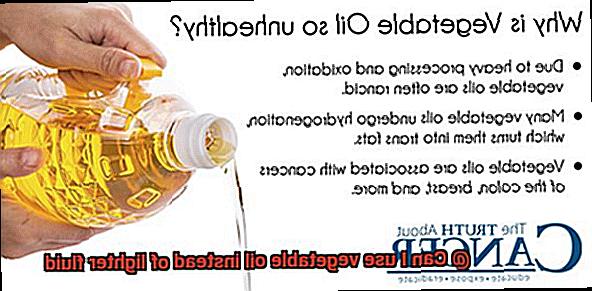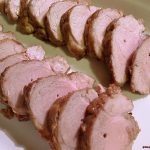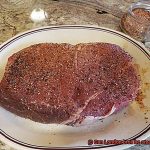Do you love the sizzle of a good old barbecue with friends and family? If so, then you’ve probably used or at least heard of lighter fluid. But did you know that it can be harmful to your health? That’s why many people are turning to vegetable oil as a safer alternative.
In this blog post, we’ll explore the question on everyone’s mind – “Can I use vegetable oil instead of lighter fluid?” We’ll discuss what lighter fluid is and why it’s potentially dangerous. We’ll also look at the safety benefits of using vegetable oil instead and provide tips on how to use it effectively.
Using lighter fluid poses numerous risks, including releasing hazardous chemicals like VOCs into the air. In contrast, using vegetable oil not only makes for a cleaner grilling experience but is also more environmentally friendly. So while cooking with fire may be a beloved pastime, we should always prioritize our health and safety.
Join us as we dive deep into this topic and discover if vegetable oil is a viable substitute for lighter fluid. We’ll explore different types of vegetable oils and discuss their pros and cons. By the end of this post, you’ll have all the information you need to make an informed decision about your grilling practices.
Contents
What is Lighter Fluid?
While it may be effective, lighter fluid can also be dangerous and leave a residue on your food. Let’s explore what lighter fluid is, its drawbacks, and alternative options.
Lighter fluid is a highly flammable petroleum-based liquid that is specifically designed to ignite charcoal or wood in grills, smokers, or fire pits. It comes in metal or plastic containers with a spout for easy pouring. There are two main types of lighter fluid: charcoal lighter fluid and multi-purpose lighter fluid. Charcoal lighter fluid contains chemicals that help ignite the coals quickly, while multi-purpose lighter fluid can be used in a variety of settings.
While lighter fluid can be effective at starting fires quickly, it has some serious drawbacks. Firstly, it can be dangerous if not used properly. The highly flammable liquid can easily ignite and cause burns or start fires if it comes into contact with an open flame or heat source. In addition, lighter fluid can leave a residue on food that can affect its flavor. This is because the chemicals in the fluid can transfer to the food as the flames from the fire come into contact with it. Lastly, some people find that the smell of lighter fluid can be unpleasant and overpowering, which can detract from the overall grilling experience.
If you’re looking for an alternative to lighter fluid, vegetable oil may seem like a natural and safe option. However, using vegetable oil as a fire starter for grilling can be dangerous. Vegetable oil is flammable and can easily ignite when exposed to high heat. Pouring vegetable oil onto hot coals or into a hot grill could cause a flare-up or even an explosion. Additionally, using too much vegetable oil can lead to excessive smoke and an unpleasant taste on your food.
So what are some alternative options? Charcoal chimney starters are a popular choice for starting fires quickly without the use of lighter fluid. Electric starters are also an option, although they may take longer than other methods. Another alternative is to use natural fire starters made from compressed wood chips or sawdust.
What is Vegetable Oil?
If you’re a culinary wizard, chances are you’re well-acquainted with vegetable oil. Derived from a variety of plant sources, such as soybeans, corn, canola, sunflowers, and palm, vegetable oil is a versatile cooking oil that’s popular in kitchens worldwide. But what exactly is it?
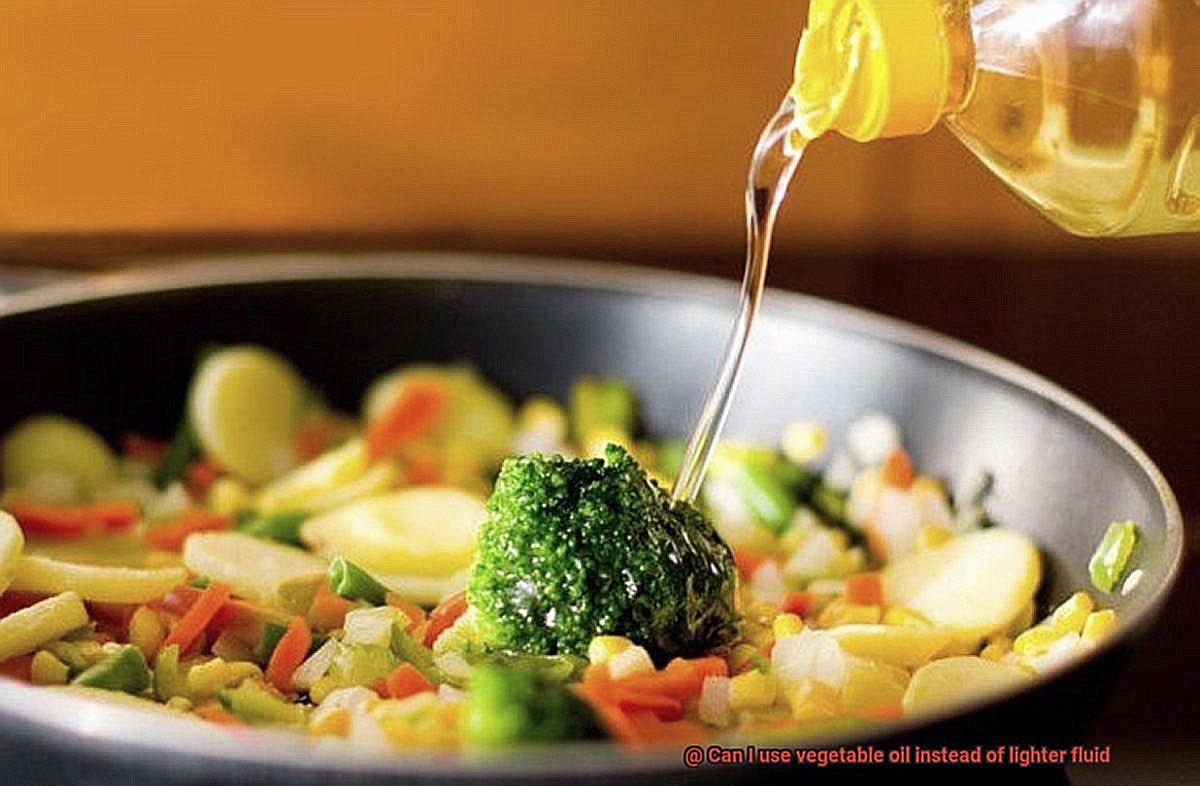
Vegetable oil is made by extracting the oil from the seeds or fruits of a plant. This can be done mechanically through pressing or grinding the seeds or chemically through solvents that dissolve the oil from the seeds. The resulting oil is then refined to remove impurities and improve shelf life.
One of the reasons vegetable oil is so widely used in cooking, baking, and frying is its neutral flavor and high smoke point. It won’t overpower the taste of your food and can be used for high-heat cooking methods like frying without breaking down.
But not all vegetable oils are created equal. Some, like coconut and palm oil, contain high levels of saturated fats that may not be as healthy as other vegetable oils. It’s important to choose wisely when it comes to your health.
Here are some of the most popular types of vegetable oils:
- Canola oil: low in saturated fats and high in monounsaturated fats
- Soybean oil: high in polyunsaturated fats
- Sunflower oil: high in polyunsaturated fats
- Corn oil: high in polyunsaturated fats
- Olive oil: high in monounsaturated fats
Is Vegetable Oil a Safe Alternative to Lighter Fluid?
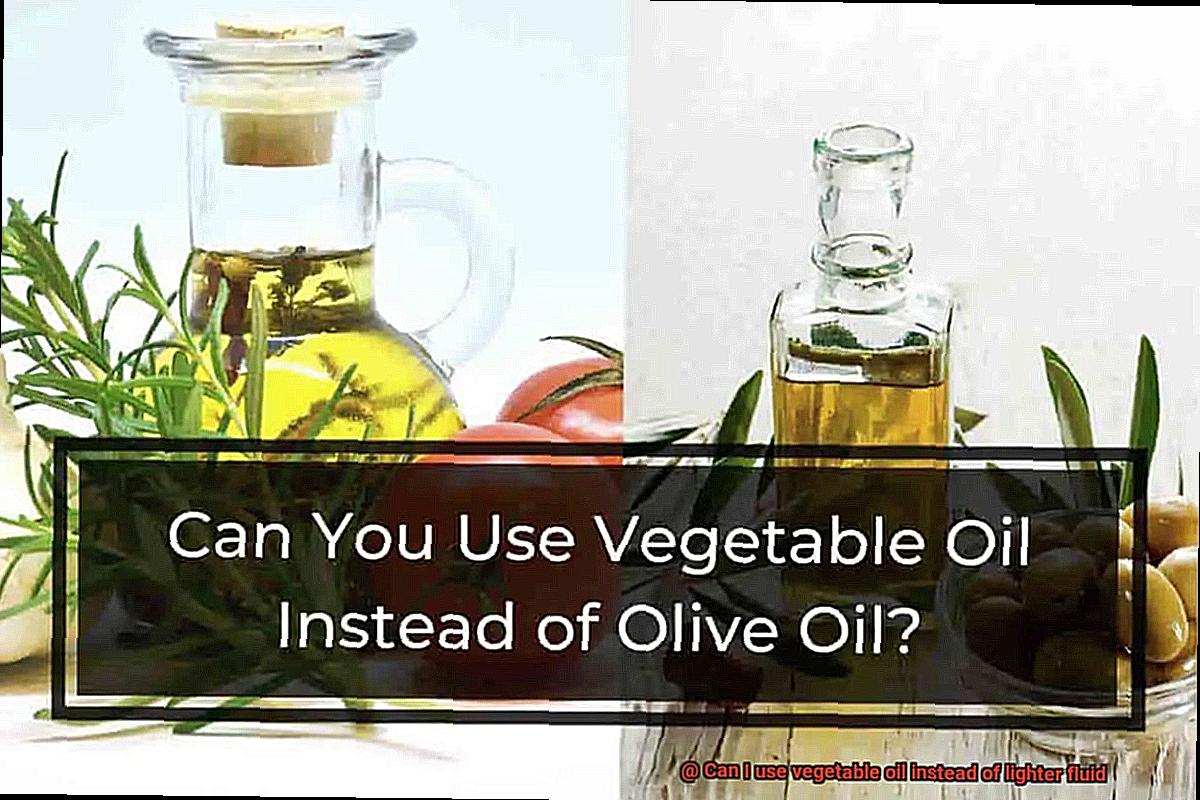
As you prepare for your next grilling adventure, you may be wondering if vegetable oil is a safe alternative to lighter fluid. The answer is yes, but with a few caveats.
Firstly, vegetable oil is a more natural and healthier option than lighter fluid. It won’t leave any chemical residue on your food and has a neutral flavor that won’t overpower your meal. However, it’s important to note that vegetable oil has a lower smoke point than lighter fluid. This means it can quickly catch fire and cause a flare-up if not used correctly. To avoid this, use only a small amount of oil and spread it evenly on the coals or grill grates.
In addition, using too much vegetable oil can produce thick smoke which can be hazardous to your health. Inhaling smoke from burning oil can cause respiratory problems and irritate your eyes. Therefore, it’s essential to use only a small amount of oil and avoid pouring it directly onto the flames.
It’s also crucial to choose the right type of vegetable oil for grilling. Some oils, like olive oil, have low smoke points and can easily burn when exposed to high heat. Opt for oils with higher smoke points like canola or peanut oil when grilling.
To summarize, vegetable oil can be a safe alternative to lighter fluid when used correctly. Here are some key takeaways:
- Use only a small amount of oil and spread it evenly on the coals or grill grates to prevent flare-ups.
- Avoid pouring oil directly onto the flames.
- Choose oils with higher smoke points like canola or peanut oil.
- Be mindful of producing thick smoke which can be hazardous to your health.
Advantages of Using Vegetable Oil Instead of Lighter Fluid
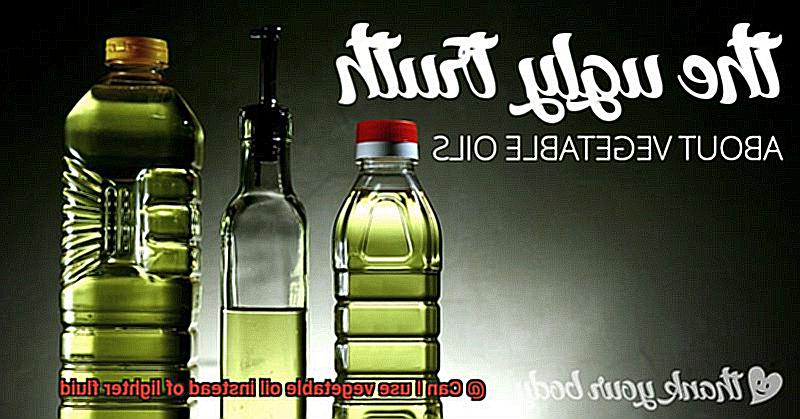
Look no further, because vegetable oil might just be the answer you’ve been looking for.
Vegetable oil is a natural and non-toxic option that has several advantages over lighter fluid. Firstly, it contains no harmful chemicals that can potentially affect the taste of your food. Unlike lighter fluid, vegetable oil is safe for consumption and won’t leave any unpleasant residue on your grill grates.
Moreover, using vegetable oil is an affordable and convenient option. You can easily find it at your local grocery store or in your pantry, making it a hassle-free option for those who don’t want to spend extra money on specialized grilling products. Additionally, it is a versatile ingredient that can be used for various cooking methods.
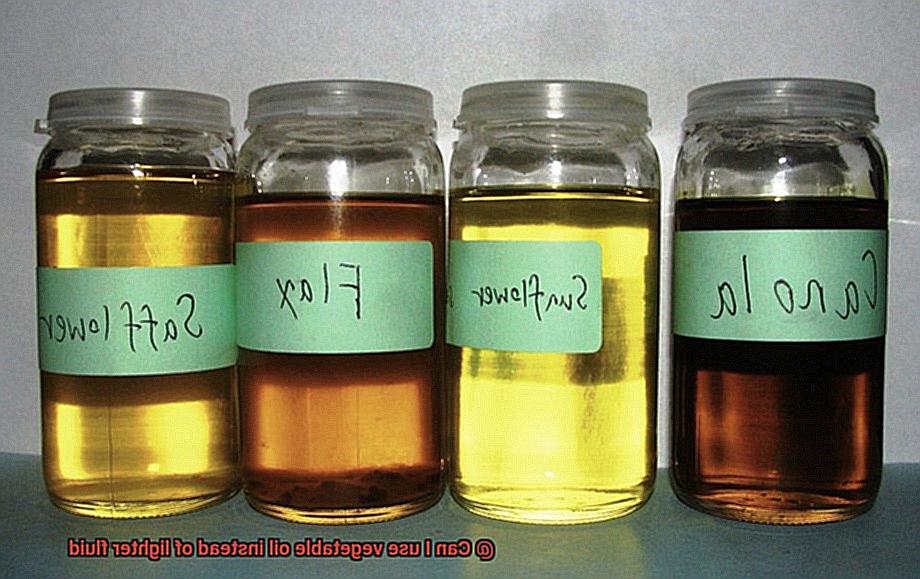
But the real game-changer comes with the flavor enhancement that vegetable oil provides. As the oil heats up and infuses with the charcoal or wood, it adds a subtle smoky flavor to your grilled dishes. This can be especially beneficial for those who want to add some extra depth to their barbeque recipes. Plus, using vegetable oil allows you to experiment with different flavors by adding herbs or spices to the oil before applying it to the grill.
Lastly, using vegetable oil is environmentally friendly. Unlike lighter fluid, which releases harmful chemicals into the air and contributes to air pollution, vegetable oil is a renewable and sustainable resource that won’t harm the environment. It’s a great way to reduce your carbon footprint while still enjoying great-tasting food.
Of course, it’s important to exercise caution when using vegetable oil for grilling. It has a lower smoke point than other oils, which means it can cause flare-ups or thick smoke that may lead to respiratory problems. To prevent this, use only a small amount of oil and spread it evenly on the coals or grill grates.
Disadvantages of Using Vegetable Oil Instead of Lighter Fluid
While vegetable oil may seem like a natural alternative, it comes with several disadvantages that could ruin your barbecue.
First and foremost, vegetable oil has a lower burning point than lighter fluid. This means that it takes longer for the coals to ignite and reach the desired temperature for cooking. This can lead to uneven cooking and longer cooking times, which can be frustrating when you’re trying to feed a hungry crowd.
In addition, using vegetable oil can result in a strong smoke flavor in your food. Vegetable oil tends to smoke at lower temperatures than lighter fluid, which can affect the taste of your food. If you’re looking for a subtle flavor, vegetable oil may not be the best choice.
Another major disadvantage of using vegetable oil is its potential fire hazard. Vegetable oil is highly flammable and can easily catch fire if it comes into contact with hot coals or flames. This can lead to dangerous situations and should be avoided at all costs.
Lastly, using vegetable oil can be messy and difficult to clean up. It tends to drip and splatter, which can make the grilling area messy and unappealing. Cleaning up grease stains and oil spills after a fun BBQ is not an enjoyable task.
How to Use Vegetable Oil as a Fire Starter
Not only is it an eco-friendly option, but it’s also easily available in most households. However, it’s important to use the correct method for using vegetable oil as a fire starter to ensure the safety of yourself and others.
To use vegetable oil as a fire starter, gather some materials such as a small bowl or container, a few cotton balls or paper towels, and about 2 tablespoons of vegetable oil. Dip the cotton balls or paper towels into the vegetable oil and let them soak for a few minutes.
Next, place the soaked cotton balls or paper towels onto the charcoal or wood chips. Light the edges of the cotton balls or paper towels with a lighter or matchstick. The vegetable oil will act as fuel and help ignite the charcoal or wood chips. But remember to avoid pouring the oil directly onto the charcoal or wood chips, as this can cause a flare-up and result in injury.
It’s important to note that using vegetable oil as a fire starter may not be as effective as lighter fluid in windy conditions. So be patient and give it time for the charcoal or wood chips to ignite.
In addition to being an eco-friendly option, using vegetable oil as a fire starter can also be cost-effective. As vegetable oil is often used in cooking and baking, you may already have some on hand. By using vegetable oil instead of lighter fluid, you can avoid harmful chemicals and fumes associated with traditional fire starters while creating a more natural option for starting your fires.
However, always exercise caution when starting any type of fire and make sure to follow proper safety guidelines. Keep a bucket of water or sand nearby in case of emergencies and never leave your fire unattended.
Alternatives to Using Vegetable Oil as a Fire Starter
As an expert in this field, I have researched and compiled a list of options that will take your grilling experience to the next level.
First on the list is chimney starters. This innovative device involves placing charcoal in a metal cylinder and lighting newspaper underneath to ignite the charcoal. The best part? It eliminates the need for lighter fluid or any other accelerant, ensuring that the charcoal is evenly lit. Say goodbye to hot spots and uneven cooking.
If you’re a nature lover, then natural fire starters might be more your style. Try using kindling or small pieces of wood to start your fire. These materials can be placed under the charcoal and lit with a match or lighter, providing a slow-burning flame that will gradually ignite the charcoal without any harmful fumes or chemicals. Plus, it adds an extra touch of rustic charm to your grilling experience.
For those who prefer convenience, electric charcoal starters are also available. These devices use a heating element to ignite the charcoal, eliminating the need for any kind of lighter fluid or other accelerant. They are easy to use and can be a safer alternative to traditional fire-starting methods.
HbAWYJ2oHxg” >
Conclusion
To sum up, using lighter fluid for grilling is not only harmful to our health but also detrimental to the environment. Thankfully, vegetable oil offers a safer and more sustainable option as a fire starter. Nevertheless, it’s crucial to handle vegetable oil with care when grilling and adhere to safety guidelines.
While vegetable oil has its perks over lighter fluid, such as being natural, non-toxic, and cost-effective, it also has some drawbacks like longer cooking times and the potential for fire hazards. It’s imperative to select the right type of vegetable oil with a high smoke point and avoid overusing it.
Apart from vegetable oil, other alternatives for starting fires include chimney starters, natural fire starters made from wood chips or sawdust, and electric charcoal starters.
Ultimately, whether you opt for using vegetable oil or another alternative depends on your personal preferences and requirements.

